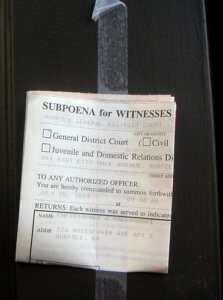Grand juries review evidence in criminal investigations and decide if probable cause exists to hand down indictments and proceed to trial. If you receive a grand jury subpoena, it means that a prosecutor wants you to appear as a witness before a grand jury.
If you have received a subpoena you need to contact an attorney for help immediately. Failing to appear after receiving a grand jury subpoena can lead to serious penalties, including arrest and fines.

How Do Grand Juries Work?
The workings of most governmental bodies, including the courts, are open for observation by the press and the public. Grand juries, however, typically conduct their proceedings in secret.
No one except individuals authorized by the court — often including only witnesses, the court stenographer and the prosecutor — are allowed to be in the jury room during grand jury proceedings.
Illinois law requires that anything that occurs in a grand jury room is privileged — meaning it is not disclosed except as authorized by law or as the prosecutor must disclose in the performance of official duties.
Members of a grand jury are prohibited from discussing the proceedings with anyone outside the court, including friends and family members. They also are required to avoid broadcast, print and online media that may include information about matters before the grand jury.
The law requires that grand jury members base their decisions solely on evidence presented to them in the grand jury room, including testimony from witnesses.
Powers and Duties of Grand Juries
Illinois grand juries have responsibility for inquiries into alleged corruption or crime. Most cases heard by grand juries are initiated by prosecutors, including the attorney general or state’s attorneys.
Grand juries also have broad powers to look into criminal matters within their districts and can conduct their own investigations without intervention from a prosecutor. As part of that right to investigate, grand juries — along with prosecutors — can witnesses.
In most cases, the prosecutor makes witnesses available to testify before a grand jury. However, the grand jury also can issue subpoenas and can question witnesses, and it can examine documents relevant to cases before the court.
Witnesses who are summoned by subpoena, either by a grand jury or a prosecutor, are allowed to have their lawyer in the grand jury room to inform them of their rights.
Can Witnesses Be Forced to Testify?
In some cases, prosecutors or grand juries call witnesses who are already charged with crimes. Prosecutors also may call a witness against whom they are seeking a Bill of Indictment from the grand jury.
If you are called as a witness to testify in a case that could result in a grand jury indictment against you, you have the right not to answer any questions that could incriminate you.
It’s also important to understand that anything you say in a grand jury proceeding can be used against you in court. You can choose to have an attorney with you at grand jury proceedings, and your attorney can fully explain your rights before you agree to testify.
In Illinois, a grand jury can determine that you’re not justified in refusing to testify. A judge then would decide if your answers to questions the grand jury wants to ask could incriminate you. If the court decides that you are obligated to answer the grand jury’s questions and you then refuse, you could be held in contempt of court.
Prosecutors also can request that the court grant immunity to a witness for any criminal wrongdoing in exchange for the state or federal grand jury testimony of the witness.
Responding to a Grand Jury Subpoena
Two types of grand jury subpoenas exist. A subpoena ad testificandum serves as an order for an individual to testify in person to the grand jury. A subpoena duces tecum seeks evidence like photographs or documents.
If you receive either type of subpoena, it’s extremely important to work with a criminal defense attorney who is experienced in Illinois grand jury matters.
Michael Petro will assist you in determining the appropriate response to the subpoena. If compliance is in your best interests, he will accompany you to appear before the grand jury on the requested date.
Depending on the specifics of the case, compliance may not always be in your best interests. Your attorney also can assist you with a refusal to comply and its possible consequences, including being held in contempt of court.
Attorney Michael J. Petro has represented many clients under investigation by a variety of state and federal agencies. Contact him today if you have received a grand jury subpoena.